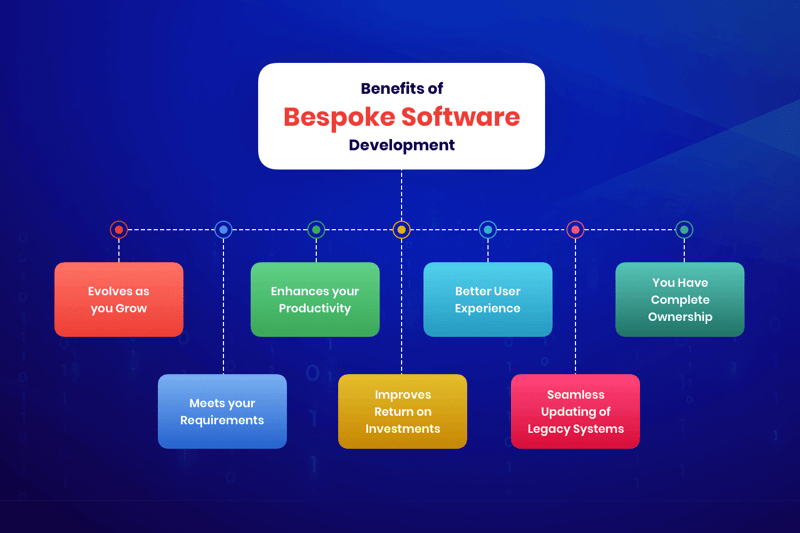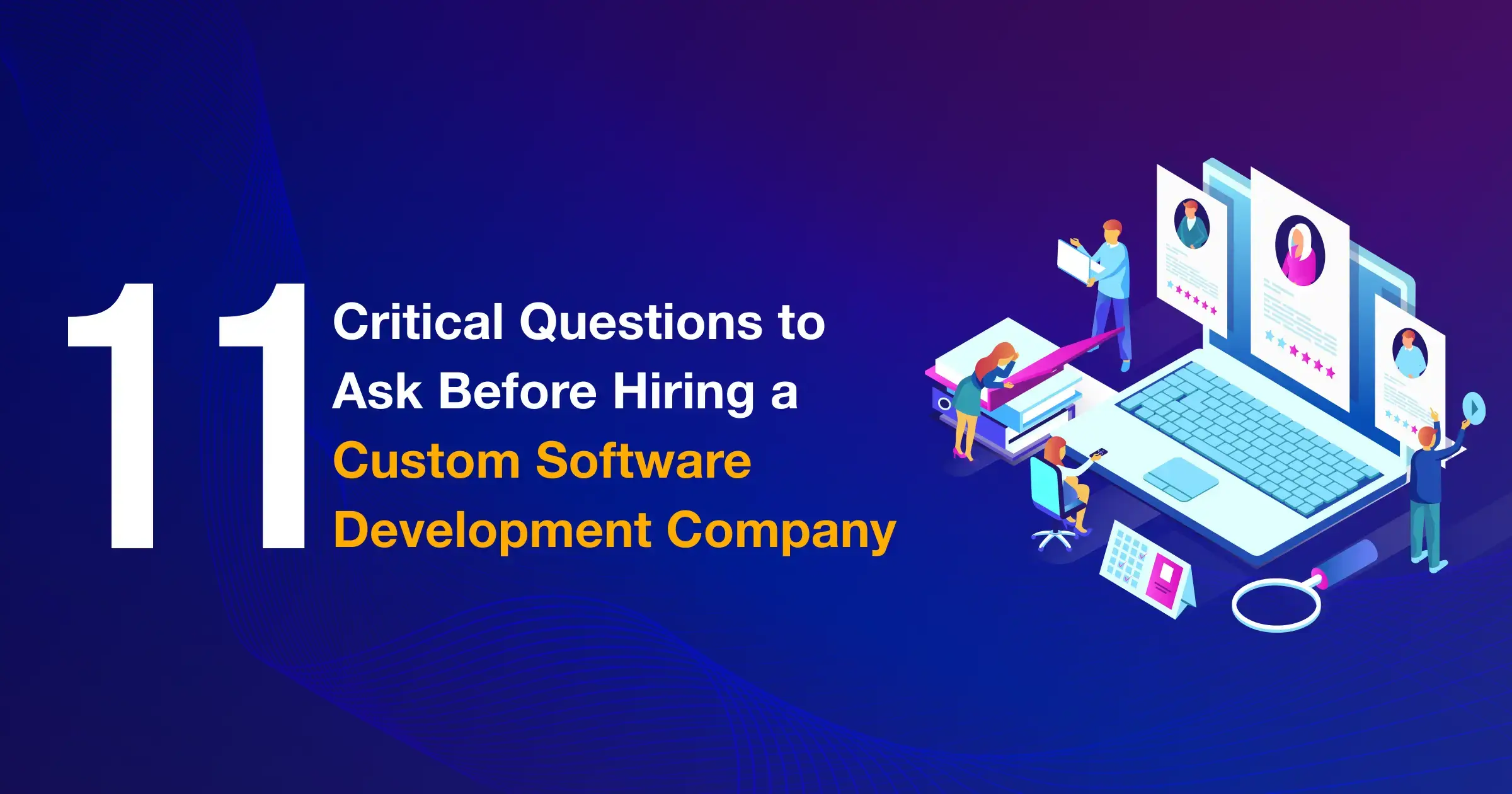
Bespoke software development is more than building software by writing code and designing the product, it’s about solving unique problems or augmenting businesses in the way they want to be. Gone are the days when one-size-fits-all solutions worked, or this stands true for at least most of the businesses.
Today, with the level of technological advancements happening and easy accessibility of software products, customization is one solid factor which makes you stand apart. Bespoke software, in that regard, aims to understand your unique needs and challenges of business, and with the use of technology, it creates solutions that bring a real change in the way you operate.
With custom software, you will be able to realize your business goals, address challenges in an effective way, and most importantly, unlike off-the-shelf software, you can scale up your business significantly.
But, let’s first fully understand what bespoke software is, how it is different from off-the-shelf software, its pros and cons, and many more which help you make an informed choice for your business.
What is Bespoke Software Development

Bespoke software development, as the name suggests, is an elaborate software development process which involves identifying the unique needs of businesses and designing and developing software solutions that specifically address those needs.
This approach of software development works from the ground-up where you can build such software by utilizing your in-house team of developers and testers or you can outsource it to an expert software development outsourcing company.
One interesting aspect of bespoke software is that it differs on many levels from the readily available off-the-shelf software applications, which are also called commercial off-the-shelf software (COTS).
Generally, off-the-shelf software is built for a wide group of audience which offers ready-made solutions and can be integrated faster, however, it lacks in addressing the unique needs of a business. You cannot alter its functionality as per your needs which poses shortcomings.
Bespoke software, on the other hand, ensures its functionalities and features greatly align with every aspect of your business’s objectives, preferences, and workflows, thus providing you competitive advantage.
What Bespoke Software Development Means for your Business
Grand View Research studies show the global market of bespoke software development was estimated to be USD 35.42 billion in 2023 and will grow at a CAGR of 22.5% from 2024 to 2030. It shows that businesses are now preferring to customize their software to stay competitive in current dynamic markets.
It has been a prevailing trend that usually small businesses and startups tend to depend solely on off-the-shelf software solutions for all their needs, but lately, it is changing as they are willing to invest in developing bespoke software that caters to their business needs.
The main reason is because bespoke software focuses mainly on customization, which helps businesses to address their dynamic needs. Developers or service providers build bespoke software by meticulously analyzing businesses’ requirements, their current capacity as well as future goals, then build customized solutions.
Many factors come into play while developing a bespoke software like the industry you’re in, type of your business, its scale, and many others. Since these factors highly differ from business to business, which is exactly why bespoke software is essential for growing your business in the long run.
Bespoke Software vs Off-The-Shelf Software
Bespoke as well as off-the-shelf software help individuals and businesses in different ways, each depending on the objectives, goals, and challenges that businesses want to address.
Both types of software fundamentally differ on some critical aspects, understanding which you can clearly distinguish their features and applications and decide when and where to use them.
| Bespoke Software |
Off-The-Shelf Software |
| You can customize the software fully as per your unique needs |
You have limited customization options available and features are mostly pre-defined |
| You can add features that you need and use for your business purpose |
They come with a set of features and modules which depend on industry and software niche |
| They require high initial investment as you will build the software from scratch |
Initial investments are comparatively less, thus, it enables faster and easier adoption |
| Cost of development varies based on the required features and the level of customization |
They have more or less fixed pricing options and subscription fees based on your plan |
| Comes highly scalable as you can scale up or down resources as per your demands |
Can be scalable but it requires you to change subscription plans each time you want to scale |
| Has high flexibility as it allows you to alter functionalities as per your needs |
They are not flexible and cannot alter their functionalities easily |
| You can opt for continuous support and maintenance after deployment |
Vendor decides on the maintenance and support options |
Benefits of Bespoke Software Development

Bespoke software has various benefits mainly due to the level of customization options it provides which you can utilize as per your business requirements.
Besides seamless customization, many factors like continuous maintenance and scalability options make bespoke software a feasible option for businesses.
Evolves as you Grow
As bespoke software applications offer high customization, they are flexible, and they evolve as your business grows and embarks on new paths. They offer a high degree of flexibility which allows you to modify their features and modules.
In the long run they help you save money as well as time as they limit your ongoing search for new software in the market to fulfill your business needs.
Meets your Requirements
Custom software is designed to meet the unique needs of your business and challenges you face, thus, it provides you with a unique solution which many off-the-shelf software may not offer.
This uniqueness adds value to your business as you can stand apart from the competition because by utilizing bespoke software you can create a new solution which did not exist before.
Enhances your Productivity
Bespoke software facilitates you to integrate the application with your existing systems which simplifies data flow between systems and improves collaboration.
Moreover, you can add new modules and features to your bespoke software, which helps you automate tasks, streamline various processes, analyze data from multiple sources, and many more.
Improves Return on Investments
It is true that it requires comparatively higher initial investment to develop a bespoke software and you incur more on upfront costs, but if you consider licensing and subscription fees, the expenses will add up year on year.
In the long run, bespoke software benefits you better in terms of saving costs, and since it can be highly customized, you have a significant market advantage, utilizing which you can experience higher returns on your investments.
Better User Experience
Bespoke software offers you better user experience as it facilitates you to customize your software based on what your end users want. Since you have better understanding of your user’s needs and expectations, you can tune your software to provide intuitive user experience which also improves the customer retention rate.
With bespoke software, you will be able to efficiently address the pain points and offer unmatched solutions which your customers and end users need.
Seamless Updating of Legacy Systems
With bespoke software, you can seamlessly update legacy systems by modernizing them and integrating them to your custom software applications.
With legacy system modernization, you gain technological advantage and at the same time you can stay relevant with the evolving landscape, all while not totally scrapping your traditional workflows.
Bespoke software allows you to integrate new features into your existing systems, thus, modernizing the way your business functions.
You Have Complete Ownership
Developing bespoke software gives you complete control and ownership over your software as you have full freedom to make changes and modifications as per your business needs.
This ensures your custom software is aligned with the needs and challenges of your business, and you can prioritize changing requirements at different times by customizing the software.
Some Common Types of Bespoke Software Solutions
Businesses operating across different industries can benefit from bespoke software as it plays an important role in helping businesses address specific challenges and achieving goals.
We can broadly classify custom software solutions into categories like enterprise software applications, mobile applications, industry-specific applications, cloud applications, and many other ways, each of which serves specific business purposes.
Enterprise Software Applications
Bespoke software applications help large organizations with enterprise-grade software apps which are highly customizable and can be integrated into their existing systems. They are designed to perform core business functions like Enterprise Resource Planning (ERP), CRM, Supply Chain Management, and many others.
Industry-Specific Software
Industry-specific bespoke software applications are designed to meet the specific needs of businesses operating across different industries as you can tune them as per your business niche.
Specialized bespoke software solutions help businesses steer through industries like healthcare, finance, retail, manufacturing, and so on, and are often equipped with necessary industry-specific compliance standards.
Bespoke Mobile Applications
As the number of mobile phone users increases over time, many brands consider developing seamless and intuitive custom mobile applications to reach their end users to stay relevant and competitive. Bespoke mobile apps help brands offer seamless user experience as it allows them to customize the apps based on user preference.
Bespoke Cloud Applications
Businesses are increasingly opting for cloud-based bespoke software as they look for ways to do away with maintaining traditional physical infrastructures. Cloud-based bespoke software applications allow you to utilize advanced cloud computing platforms to run your software which ensures high scalability and flexibility.
Moreover, bespoke cloud-based software ensures increased security as you can implement best security practices like multifactor authentication, data encryption, and so on.
Bespoke E-Commerce Software
E-commerce platforms customized to your business needs come highly useful as you can personalize your customer experience by utilizing artificial intelligence and other advanced features.
Moreover, you can add features to your bespoke e-commerce software like payment processing, order fulfillment, inventory management, etc., which provide you with unique solutions at each level and competitive edge.
Bespoke Software Development Process

You can see there are different stages of development involved in building a robust bespoke software, and various development models that experts prefer based on their expertise and software requirements.
Requirements Gathering
Gathering required information about business and software is the first and critical step, which sets the groundwork for developing an all-inclusive bespoke software. It involves close collaboration between the client side and the development team as developers understand the needs, requirements, and challenges in a comprehensive way.
This is where the team decides on milestones to reach, goals to achieve, and potential challenges along the way to address effectively, which facilitates an efficient development process. Here are some critical activities:
- Understanding client needs
- Clearly defining the project scope
- Choosing the best development methodologies
- Picking the right stack of technology and tools
- Developing robust project plan with goals and challenges
Creating Designs
Once both sides are clear about project scope, objectives, and goals, it is time to look for ways to decide how best to build the custom software. Here, the design and development team creates architecture which is crucial for the development process.
Moreover, the team designs prototypes, wireframes, or high level design docs, which help to illustrate the software architecture and user interface.
Developers add all the required internal modules in the SRS document which details all necessary information about the software development processes.
Developing and Implementing
The actual development process happens in this stage where bespoke software developers turn conceptual design documents into actual software by implementing relevant tools and technologies.
They build the product by writing the code, which best suits clients’ requirements and decided in the previous stage. The team then implements various development methodologies, for instance, agile methodology which is a popular one.
In daily scrum meetings, the team and client side gather and discuss the progress so far and steps to do further. Here, the development team builds the actual product - bespoke software - as per the clients’ specifications.
Testing
Once the custom software is developed, it is put to test where the testing team thoroughly checks if there are any bugs or issues with the product. The team may implement various testing practices, some of which are:
- Unit Testing
- Integration Testing
- System Testing
- User Acceptance Testing
- End-to-End Testing
- White Box Testing
- Blackbox Testing
- Interface Testing
Additionally, the testing team also checks for security robustness, load test, and others which ensure the software withstands a variety of challenges and qualifies for end users to integrate.
Deploying and Maintenance
The final stage ensures that the newly built software is ready to use by businesses as the deployment team installs the application and integrates it into clients’ existing systems. The team follows meticulous process of carefully installing the product in the physical server or helping clients utilize cloud platforms.
This is a critical stage where the true readiness of the software is put to test, and there are possibilities that some issues may arise when releasing the software for clients’ use. The deployment team makes sure the software functions as desired, and they check clients’ digital infrastructure and address challenges if any.
Every bespoke software enjoys prolonged maintenance by the development team even after deploying them for business needs, which is a main benefit. The custom software development company takes care of maintaining the software post deployment, as the team checks the software and ensures optimal performance.
To Sum Up
Bespoke software development is a critical strategy that a business adopts which helps it secure a top spot in rather competing markets. Organizations of all sizes get benefitted by customized software solutions because of their unique challenges and goals.
Beyond offering a plethora of business benefits, bespoke software offers a high sense of security which is a huge asset for any brand. You can implement robust security measures and industry best practices to make the software more secure, which enables you to perform your routine business operations in a secure environment.
This comes highly crucial for businesses operating in industries that deal with sensitive data like health and financial data. While opting for bespoke software solutions, carefully evaluate your business needs and challenges that you want to address, then choose the software development company that fulfills your needs. These will help you transform your business with custom-built software solutions.













